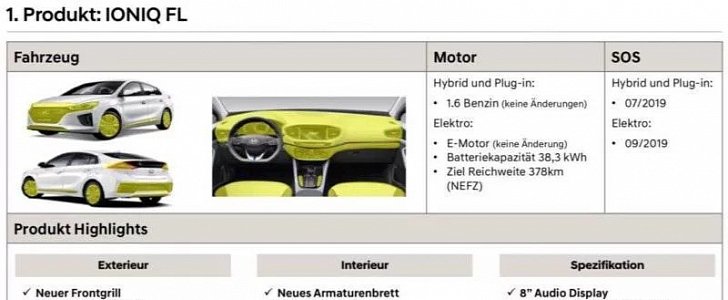Following the online reveal of the facelifted Ioniq, a marketing slide has leaked onto the Internet, revealing the 38.3-kWh battery of the Electric. This puts the Ioniq in the crosshairs of the Nissan Leaf, translating to an EPA estimate in the ballpark of 160 miles, maybe 170 miles.
By comparison, the Nissan is capable of 150 miles from its 40-kWh battery. Coming courtesy of Andi3110 on the goingelectric.de/forum, the slide also reveals a New European Driving Cycle range of 378 kilometers (235 miles) for the Ioniq Electric.
The Elektro is expected to arrive in Germany in September 2019, and on the other hand, the Plug-In Hybrid and Hybrid will roll out in July 2019. “Keine Änderung” next to the E-Motor translates to no changes in output for the electric motor, rated at 120 PS (118 horsepower) and 295 Nm (218 pound-feet) of torque.
Changing from 28 to 38.3 kWh is huge for the Ioniq Electric, but the Ioniq Plug-In Hybrid hasn’t been forgotten either. Now rated at 8.9 kWh, the lithium-ion polymer battery is sure to feature an increased capacity. If Hyundai can add 37 percent as it’s the case with the Electric, then the best-case scenario would be 12.2 kWh for the Ioniq Plug-In Hybrid.
As a brief refresher, the Niro Plug-In Hybrid from Kia shares the 8.9-kWh battery with the Hyundai. In regard to the cheapest and most popular Ioniq of them all, little is known about the powertrain and battery of the Hybrid for the 2020 model year.
What’s certain is the 1.6-liter GDI Kappa III four-cylinder engine, which features the Atkinson cycle and a six-speed DCT. The 1.56-kWh battery is larger than the 1.2 kWh in the Toyota Prius (One and Two; other trim levels get 0.75 kWh), so don’t expect Hyundai to operate too many changes in this regard.
As far as pricing is concerned, Hyundai isn’t the type of automaker to ramp up the MSRP by a ludicrous margin with the mid-cycle refresh of a model. For reference, the Hybrid starts at $21,650, Plug-In Hybrid at $25,350, and Electric at $30,315 before the federal tax credit.
The Elektro is expected to arrive in Germany in September 2019, and on the other hand, the Plug-In Hybrid and Hybrid will roll out in July 2019. “Keine Änderung” next to the E-Motor translates to no changes in output for the electric motor, rated at 120 PS (118 horsepower) and 295 Nm (218 pound-feet) of torque.
Changing from 28 to 38.3 kWh is huge for the Ioniq Electric, but the Ioniq Plug-In Hybrid hasn’t been forgotten either. Now rated at 8.9 kWh, the lithium-ion polymer battery is sure to feature an increased capacity. If Hyundai can add 37 percent as it’s the case with the Electric, then the best-case scenario would be 12.2 kWh for the Ioniq Plug-In Hybrid.
As a brief refresher, the Niro Plug-In Hybrid from Kia shares the 8.9-kWh battery with the Hyundai. In regard to the cheapest and most popular Ioniq of them all, little is known about the powertrain and battery of the Hybrid for the 2020 model year.
What’s certain is the 1.6-liter GDI Kappa III four-cylinder engine, which features the Atkinson cycle and a six-speed DCT. The 1.56-kWh battery is larger than the 1.2 kWh in the Toyota Prius (One and Two; other trim levels get 0.75 kWh), so don’t expect Hyundai to operate too many changes in this regard.
As far as pricing is concerned, Hyundai isn’t the type of automaker to ramp up the MSRP by a ludicrous margin with the mid-cycle refresh of a model. For reference, the Hybrid starts at $21,650, Plug-In Hybrid at $25,350, and Electric at $30,315 before the federal tax credit.








